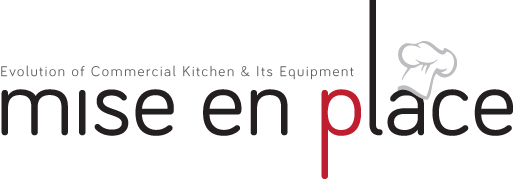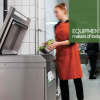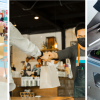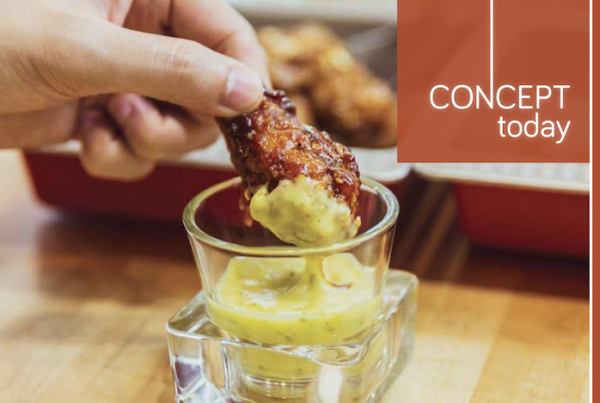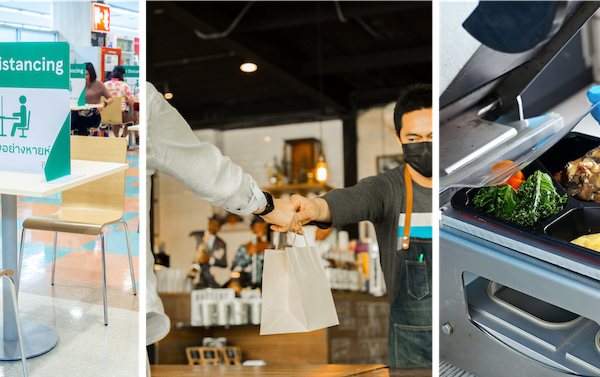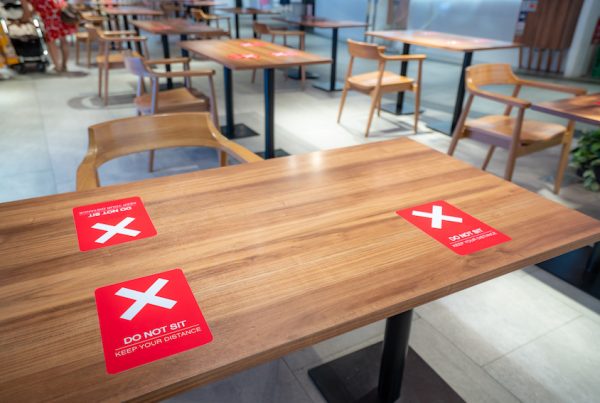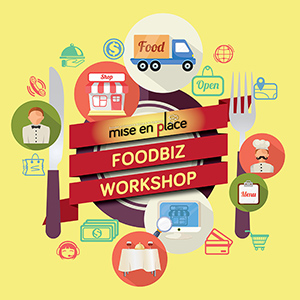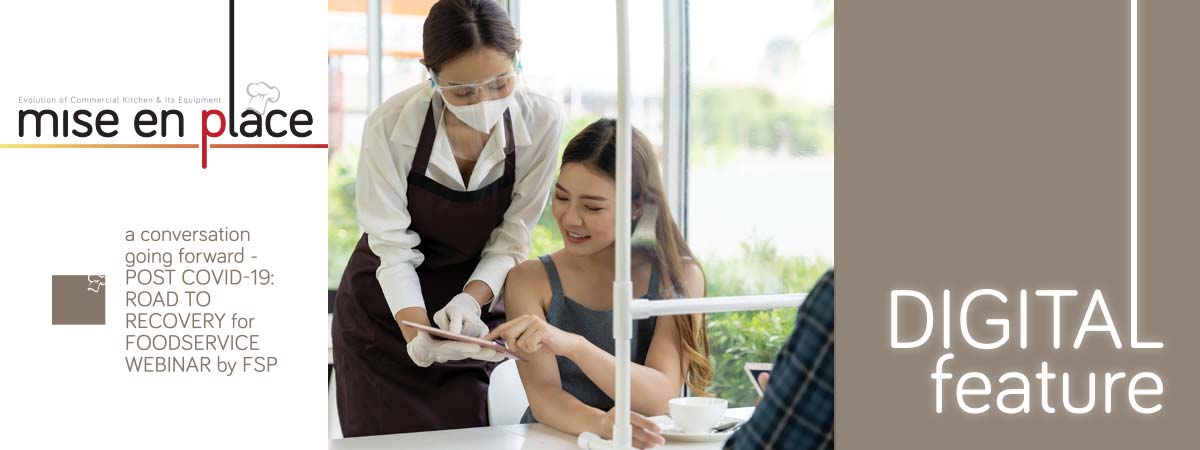 Though there have been many statements made about reopening, in actual fact, for many F&B and Hospitality businesses, these establishments did not close throughout. Yes, navigating the first few weeks of lockdown, movement restrictions or whatever term it was called in your country, was challenging but most hospitality businesses remained open.
Though there have been many statements made about reopening, in actual fact, for many F&B and Hospitality businesses, these establishments did not close throughout. Yes, navigating the first few weeks of lockdown, movement restrictions or whatever term it was called in your country, was challenging but most hospitality businesses remained open.
Rather than addressing it as reopening, recovery should be the correct term. This is precisely what the committee at FSP wanted to highlight for their topic in the first webinar. Instead of the usual meetings and gatherings like before, the first meet of Foodservice Professionals in Asia has gone digital.
Hosting the first webinar and moderated by council committee member, Ms Millie Chan – Regional Director of Asia & Pacific of Gruppo Cimbali, the council has selected a group of experienced personalities. Mr Michael Wang, Senior Continent Head represented Marriott International Asia Pacific, while Mr. Ralph Frehner, Vice President for Design Development Operations, represented Global Design Asia Pacific. Sitting in to share his views as a voice for the independent food and beverage establishment was Chef Dave Pynt, Chef-patron of Burnt Ends, a modern Australian barbecue restaurant in Singapore’s Chinatown neighbourhood.
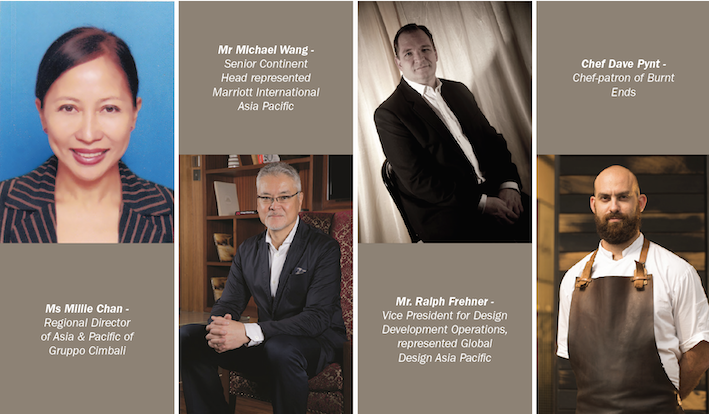
Titled Post Covid-19: Road to recovery for Foodservice – the panel covered a wide range of relevant topics starting with the question on how manufacturers can play a role in helping with the recovery.
To this question, Ralph explained that for him, it is important for the brands to understand that owners and everything that is poured into the build-up and set-up comes down to investment made and its feasibility. Technology is great but its reliability, and adaptability when changes are necessary at a rational cost in the long run would be at the forefront for users.
Dave agreed with this and further points to the notion of practicing sustainability; businesses are closing and used machines are offered at attractive prices, but service and warranties are of course up in the air for interpretation. Dave hopes that brands see this as an opportunity to score brownie points to assist these new and current operators to start or get back on their feet. Service charges and fees are acceptable as this would still be lower and addresses the issue of sustainability, both for the books and the environment.
From a design perspective, Michael opines, “Manufacturers should understand that the hotel segments have changed. Luxury tiers with more budget have dropped to below 10% from 25% before, whereas Select/Limited service hotel segments have grown and is still growing to at least 60% for Marriott, which you would see some in the 1200 projects that we have in the pipeline. Brands must understand that this shift would prioritise efficiency over anything else”.
Naturally with these shifts, Millie asked if that means there might be a reduction in the number of restaurants in a new hotel unlike what we were normally used to.
“As always, it’s the bigger picture. Marriott believes in building these restaurants for the local community and not just for our guests. More hotels will look at adopting the idea to have free standing restaurants as a way to move forward and the overall hotel concept will actually determine the restaurant offerings in the hotel for the community”, Ralph shares this important point.
The next question focuses on what aspects a foodservice business should value when doing damage control or when it comes to making the hard decisions to stay afloat.
For Dave, as an independent business, they had to “rip their guts out” and review everything; from physical aspects like air-conditioning, the efficiency of equipment and packaging to the amount guests were spending to asking the most important question, “Are we still relevant in terms of menu offerings?”. The uncertainty had the team running a week-to week cycle of checks and balances to evaluate how they were doing and if changes were necessary. To Dave, these checks will show him if his business and concept is adaptable to weathering changes or if these changes might result in the ultimate cost of losing the business completely.
“That’s why being lean and mean is the way to be and it is more important than ever!”. During this “break”, Ralph uses the time to analyse what they can trim. From operations to concepts, or even the possibility to renovate, upgrade or even converting some hotels, Ralph totally supports the theory of constant review. Not being able to spend like how you used to, is a great motivator.
To both Dave and Ralph, Millie asked if there would be drastic changes coming into the commercial kitchen and technology’s role in the picture. Both gentlemen agreed that it all comes down to efficiency – better, harder and faster. Show kitchens are still much in demand, just that expectations would be higher in terms of safety in Dave’s view. More digitalisation would also be coming into the picture especially for operations.
For Ralph, efficiency with technology is good but education takes precedence – educating every role in the kitchen to become more sustainable in the new normal so that the impact is minimal on the environment. It should start with the everyday simple things like water and electricity that actually has a big impact on costs. Technology also comes with a price. Although Ralph prefers traditional equipment to a high-tech one in some cases, having these technologies in the kitchen boils down to the person’s role and the planning of the operations.
Michael agrees and adds that at the end, adoption of these technologies would fall back on the affordability of its owners and sustainability of the operations.
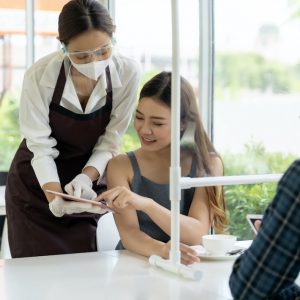
Asian waitress wear facemask and face shield using tablet to show restaurant electronic menu to reduce touching and recommend to customer. New normal technology and lifestyle food and dining concept.
There was a buzz that Covid-19 might also bring the end of Buffets and All-Day Dining (Big Breakfast), which are popular for hotels, and this inevitably led to the next question, “will we be seeing a redesign in this aspect?”
With these new demands and despite the high costs, show kitchens will not be disappearing anytime soon and the answer, to Ralph, is learning how to be more flexible when it comes to running a show kitchen. A tip to hedge the area or making it a display kitchen without a direct interruption/interaction could address the concerns of contamination and safety.
Whereas for Dave, as Burnt Ends is already very much a show kitchen set up, he doesn’t see a change to his concept. The only feature that he sees continuing Post Covid-19 is that masks would be here to stay.
Touching on the topic of changes expected, all three gentlemen shared the idea that each concept has somewhat determined the expectations when it comes to cleanliness and safety. Luxury hotels tend to have better expectations with the space and service while other concepts would have to implement innovative ways to service their guests. As for Dave in the kitchen, the show kitchen concept has always kept his team in line and behaved better.
Touch-less service would also take root which is evident in the growth of digital menus and the boxed food presentation that forgoes the need for wait service. With the present potential for mutation of Covid-19, Michael cautions on the importance of good air exchange, not just in the kitchen but your overall facility.
To the final question on whether things will go back to normal once a vaccine is developed, in summary, it would be the new normal where everyone agrees that logical and safe practices in areas of hygiene developed during this pandemic will continue, and strengthen with new technologies going forward.
Thanking the panel as she wound down the session, Millie asked the 3 gentlemen for any last thoughts that they had to share. In reply, Michael’s advice was, to be flexible, creative and be on guard while Ralph said he was looking forward to new partnerships. Dave replied that he was welcoming more open communication as everyone continues to build the best guest experience for their guests.
Keep safe and Take care!
 Foodservice Professionals Fellowship (FSP) is an informal group dedicated to organising fellowship dinners to foster the cooperation and collaboration of professionals in the industry.
Foodservice Professionals Fellowship (FSP) is an informal group dedicated to organising fellowship dinners to foster the cooperation and collaboration of professionals in the industry.
The council members are made up of volunteers from equipment manufacturers, Foodservice and Hospitality consultants and kitchen contractors operating in SouthEast Asia.
Here are some quick takeaways and insights from the webinar – courtesy of FSP’s founding member -Mr Alburn William of CKP Hospitality Consultants.
• New projects going through feasibility stage may slow down but projects on the drawing board will not, due to a 3-4 year window till completion date.
• A second spike is an issue as it would impede any early signs of economic pickup.
• The reuse equipment market may get a shot in the arm, and provide much impetus for new restaurant start-ups. In a risky environment, investors may look to this avenue to reduce capital expenditure outlay
• People in wealthy cities like Singapore still want to patronise luxury tier restaurants as these have a better perception of sanitization, social distancing and safety.
• Luxury hotel segment to drop in the short term and select service to increase to meet changing market segments from international/business to regional/leisure.
• Hoteliers and developers will consider the shift to Efficiency modelling of project design through effective prototyping, especially for select service.
• Free standing restaurants may see a gateway into hotels. Hoteliers would want to focus more on the primary aspects of their business in increasing overall guest experience.
• The ‘everything for everyone’ type all day dining restaurant model may soon be over as specificity and flexibility may be the future name of the game. Nevertheless, buffets are on the upswing in post-Covid China. The high levels of food waste in a buffet are a source of concern in a sustainable world. Buffets in many hotels are adapting their delivery style to a served buffet concept instead of self-service.
• Many restaurants are using this opportunity to re-examine their restaurant design and operations; and cutting out what is perceived as fat. Building and operating a restaurant in the post-Covid world is a new business model that needs new insight and creativity.
• Technology is embraced in the post-Covid world of hospitality with increased usage of personal gadgets and iPads to order food, pay, check into and open rooms, access concierge service and so on.
• The new normal of hotel operations requires training and re-education of existing staff.
• Room service will be handled like packaged delivery much like Uber or Grab from a ghost kitchen in the back-of-house.
• Guests may insist on seeing waiters and chefs in masks. The day of the designer mask may have hit homerun.
• Food supply chains are being examined in light of recent breaches as noted. This, if not checked, could affect the safety and well-being of a hotel’s guests.
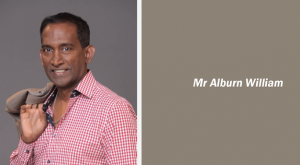 Our thanks to Alburn for the concise list!
Our thanks to Alburn for the concise list!
href="#" data-color-override="false" data-hover-color-override="false" data-hover-text-color-override="#fff">Button Text
